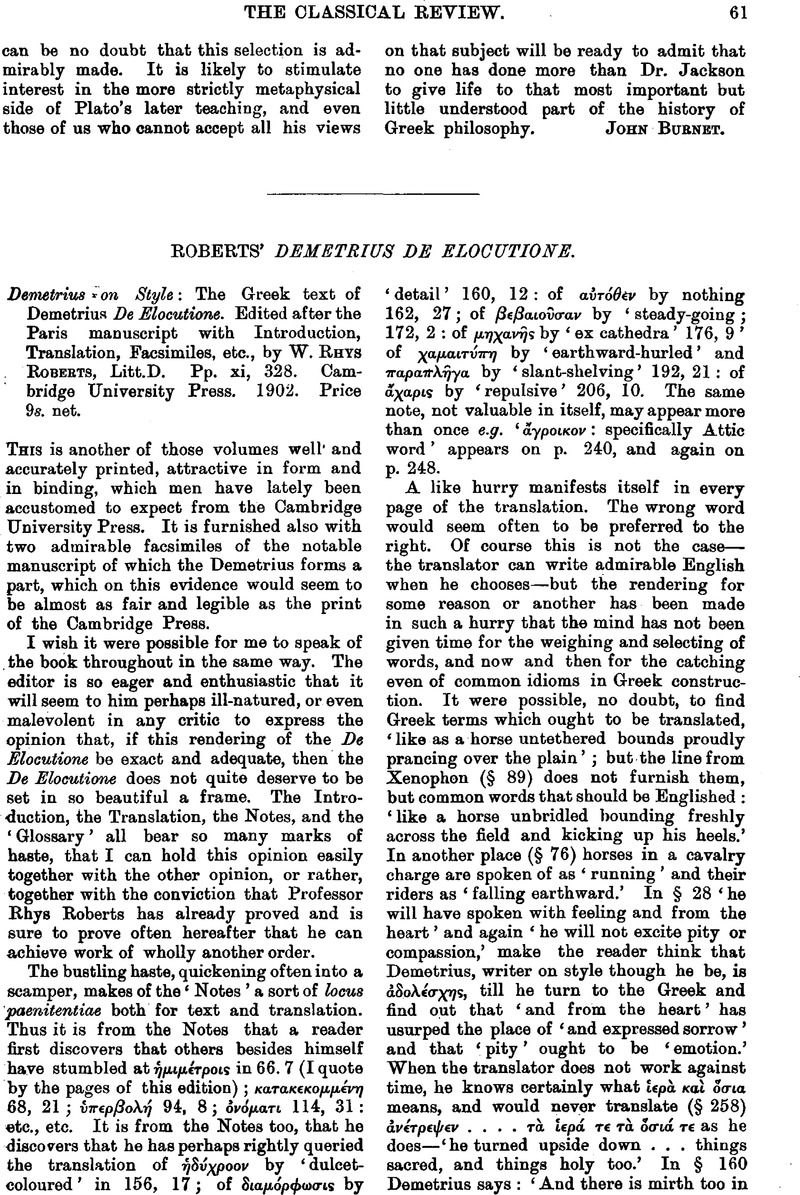No CrossRef data available.
Article contents
Roberts' Demetrius de Elocutione - Demetrius on Style : The Greek text of Demetrius De Elocutione. Edited after the Paris manuscript with Introduction, Translation, Facsimiles, etc., by W. Rhys Roberts, Litt.D. Pp. xi, 328. Cambridge University Press. 1902. Price 9s. net.
Published online by Cambridge University Press: 27 October 2009
Abstract

- Type
- Reviews
- Information
- Copyright
- Copyright © The Classical Association 1903
References
page 62 note 1 Radermacher also would mark a lacuna after κατωρθωκτα, so I shall translate the passage as it stands; ‘There is another way, however, in which little things are turned into great; and this way is not by sinning against good taste, but on occasion by calling them great because we must; as when we desire to extol a magistrate for rectifying little things as though he had rectified great, e.g. because a Spartan ephor flogged a man who had played a game of ball with un-Spartan eagerness. This as first told to us being a little thing, we descant upon it, saying that to let bad customs of a trivial sort alone is to open the way for bad customs of a more serious kind, and that we had better inflict punishment when the law is broken in trifles, and not wait till it is broken flagrantly ; and we shall go on to quote the proverb ρχ δ τοι ἥμισυ παντς just as though it were applicable to the little error in conduct with which we deal ; or we shall even assert that no error in conduct is trivial. In this way then we may have leave to give to that which is a little reform the dignity of a great reform, yet not by sinning against good taste ; but just as a good purpose is often served by belittling what is great, so also may that which is little be magnified.’
page 63 note 1 The manner in which speech is made clear and stately, and further, is invested with beauty too and with spiritedness, has been explained in what precedes ; and thereupon should follow as of course our account of ἦθος. It is of no ordinary concern that on the one hand you should be told how this feature too of the spoken word, that, namely into which ἦθος enters, is produced, and that on the other hand being able yourself to produce it, you should either, if occasion there be, impart this kind of ἦθος to the spoken word from first to last, or again should combine it with any or all of the features already described, with violence of tone, for example, or with reverence of tone, or with beauty, etc.; for by ἦθος here I mean not merely that only which cannot but declare its presence in the spoken word from first to last, just as the colour of a substance cannot but declare itself in that substance ; but I mean further that which by its nature is fitted to combine with any other feature whatsoever, with violence of tone, and with severity of tone, and with the other features one and all. The former kind will arise as often as the words which you assign to the persons whom you may represent, belong to them and suit them, be they magistrates, for example, or men who practise the art of speaking for a living, or be such as are in particular designated ἠθικο, the glutton, for example, the coward, the miser, or the like. Yes, and we shall see when we discuss the perfect orator (viz. in W. 356 ff. = Sp. 390 ff.) which features (in the spoken word) are appropriate to this person, and which to that. But the other kind, that meant here, may be employed either alone or in its varieties throughout anything yon may say at any time, just as reverence of tone, or severity of tone, or any of the other features may be employed ; and it may be employed too after the same manner as are they, and in any several passage may be used with advantage, as may be found to be the case frequently in Demosthenes. My meaning will no doubt become clearer when you study what I say of him.
Now ἦθος in speech is the product of reasonableness and of simpleness, and furthermore of the impression given respecting either that it is real and represents the mood of the moment (is intuitive). The aggrieved tone falls under speech affected by ἦθος, does not however constitute it, as do simpleness, and reasonableness, and the note of truth and the air of intuition ; no, nor can the aggrieved tone be studied in itself, as can each of the features here-tofore discussed, but simpleness or reasonableness, or some other of the things connected with ἦθος, must in every case accompany it in a greater measure or in a less.
page 65 note 1 ‘Just as the continuity of poetry is broken by its metres, e.g. < > meters or hexameters, etc., so also in the expression of thought in prose, the κλα or members, as they are called, break and sever the continuity, giving thereby rest, it may be said, to the meaning itself no less than to him who expresses the meaning, determining too, it may be said, the spoken word at many determinate points, when it would indeed be long and indeterminate, and would strangle outright him who spoke it.’ What is meant by μακρς and by πειρος is brought out after the manner of Demetrius in §§ 47 and 202.




